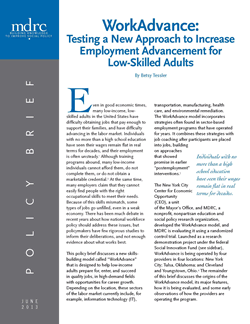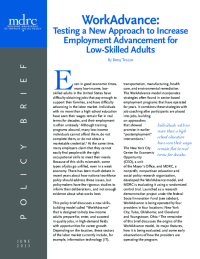WorkAdvance
Testing a New Approach to Increase Employment Advancement for Low-Skilled Adults

Even in good economic times, many low-income, low-skilled adults in the United States have difficulty obtaining jobs that pay enough to support their families and advancing in the labor market. Individuals with no more than a high school education have seen their wages remain flat in real terms for decades, and their employment is often unsteady. Although training programs abound, many low-income individuals cannot afford them, do not complete them, or do not obtain a marketable credential. At the same time, many employers claim that they cannot easily find people with the right occupational skills to meet their needs. Because of this skills mismatch, some types of jobs go unfilled, even in a weak economy. There has been much debate in recent years about how national workforce policy should address these issues, but policymakers have few rigorous studies to inform their deliberations, and not enough evidence about what works best.
This policy brief discusses a new skills-building model called “WorkAdvance” that is designed to help low-income adults prepare for, enter, and succeed in quality jobs, in high-demand fields with opportunities for career growth. Depending on the location, these sectors of the labor market currently include, for example, information technology (IT), transportation, manufacturing, health care, and environmental remediation. The WorkAdvance model incorporates strategies often found in sector-based employment programs that have operated for years. It combines these strategies with job coaching after participants are placed into jobs, building on approaches that showed promise in earlier “postemployment” interventions.
The New York City Center for Economic Opportunity (CEO), a unit of the Mayor’s Office, and MDRC, a nonprofit, nonpartisan education and social policy research organization, developed the WorkAdvance model, and MDRC is evaluating it using a randomized control trial. Launched as a research demonstration project under the federal Social Innovation Fund, WorkAdvance is being operated by four providers in four locations: New York City; Tulsa, Oklahoma; and Cleveland and Youngstown, Ohio. This brief discusses the origins of the WorkAdvance model, its major features, how it is being evaluated, and some early observations of how the providers are operating the program.






